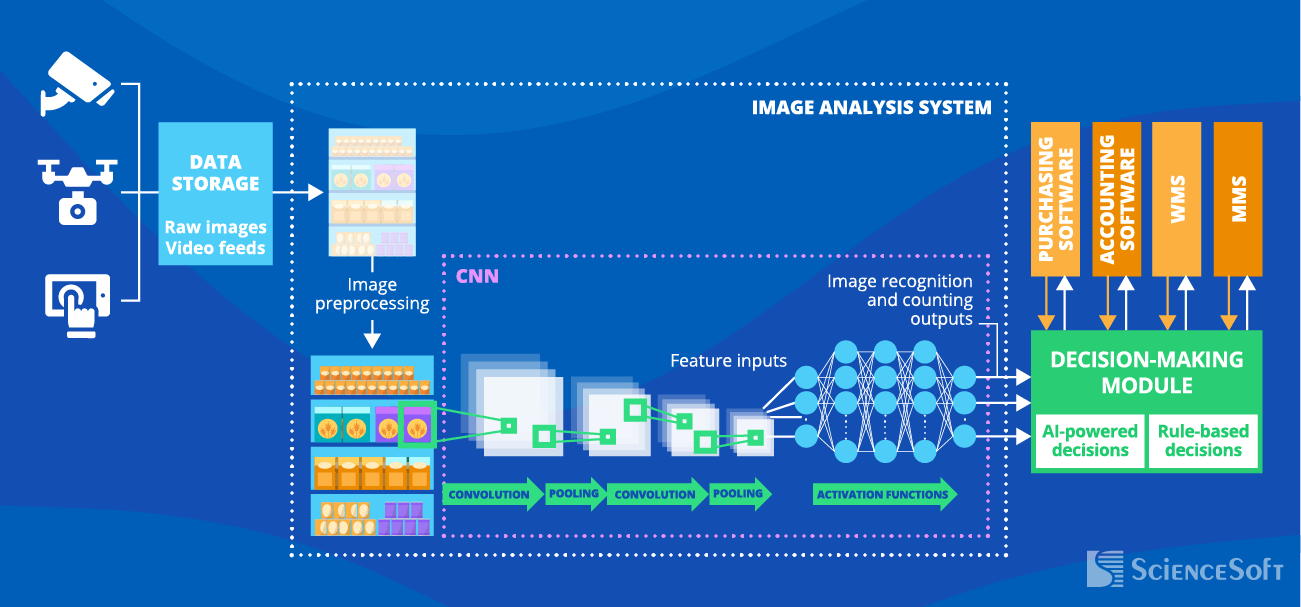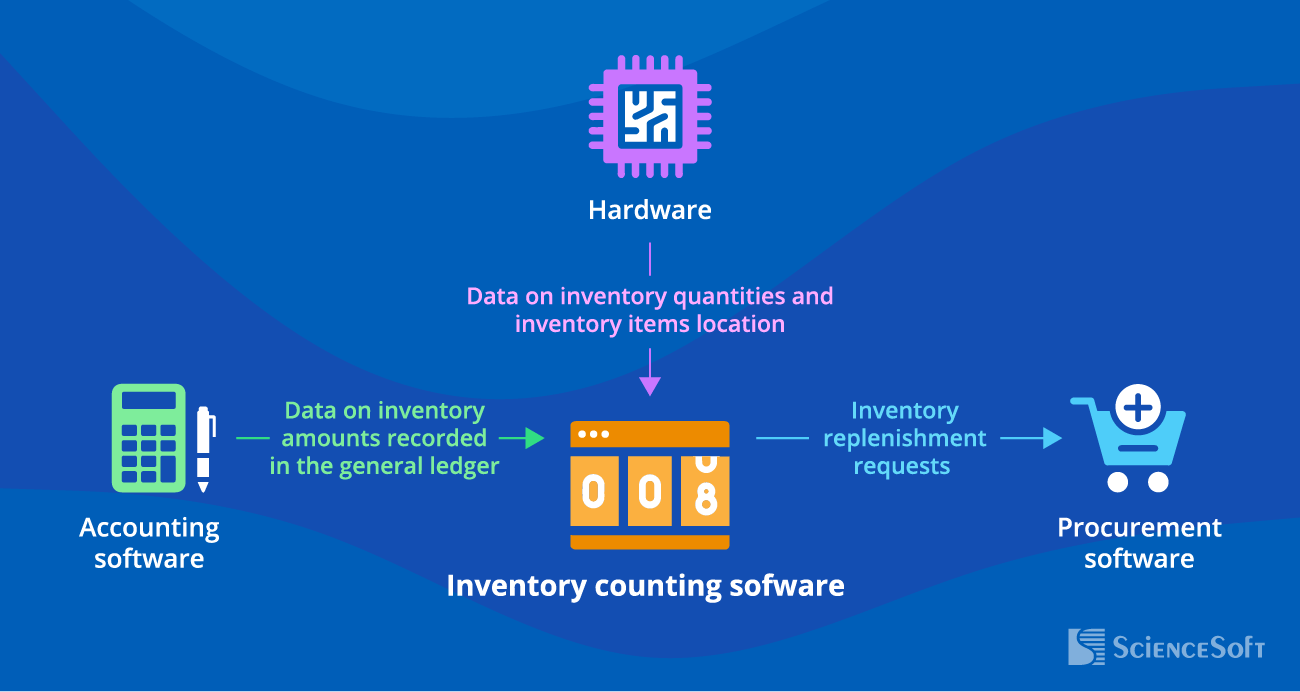Custom Inventory Counting Software
All-Around Overview
ScienceSoft brings 12 years of experience in supply chain software development, 11-year practice in designing and building image analysis solutions, and 13-year expertise in IoT to introduce effective inventory counting solutions.
Inventory Counting Software: The Essence
Inventory counting software helps companies improve the speed and accuracy of stock counting processes and enhance productivity of employees involved in inventory planning and control tasks. Such solutions rely on computer vision, IoT, and barcode/QR code scanning technologies to provide inventory counting automation. Custom inventory counting software facilitates monitoring of inventory levels and location and can provide analytics-based guidance on inventory replenishment, which helps companies avoid stockouts and overstocking.
|
|
|
|
|
|
|
|
|
Main Approaches to Inventory Counting Automation
There are several main approaches to inventory counting automation that define the architecture, functional capabilities, and necessary integrations for an inventory counting solution. Below, ScienceSoft describes benefits and limitations of each approach so that companies could choose the one that fits their stock counting needs best.
Barcode- or QR-code-based inventory counting with handheld devices
The degree of automation: Semi-automated.
Capabilities:
- Manual scanning of barcodes and QR codes on inventory items’ package with scanners, mobile or wearable devices.
- Automated calculation of inventory levels based on the data retrieved from barcodes and QR codes.
Main benefits:
- Improved counting speed comparing to traditional physical counting.
- No need to set up complex hardware infrastructure.
Limitation: Manual scanning is labor-intensive, time-consuming, and error-prone.
RFID-based inventory counting with autonomous devices
The degree of automation: Fully automated.
Capabilities:
- Automated transmission of data from RFID tags placed on inventory items to the RFID readers installed in the facility.
- Automated calculation of inventory levels based on the data retrieved from RFID tags.
Main benefit:
- Fast and accurate inventory counting across even large storage facilities, during inventory receipt and dispatch.
- Completely eliminated manual efforts.
Limitation: High implementation cost due to the need to set up RFID readers and place RFID tags on each individual item.
Inventory counting with computer vision
The degree of automation: Fully automated.
Capabilities:
- Automated capture of inventory items in a human-eye-like manner and counting them with the help of cameras installed in the facility, on robots or drones.
Main benefits:
- Instant and precise counting of static and moving inventory items, inventory in piles, stacks, and more, including touching and overlapping objects, without human involvement.
- The ability to count inventory not labeled with barcodes, QR codes, RFID tags.
Limitation: Computer vision model design, training, and fine-tuning requires the involvement of data scientists, which increases initial project investments.
ScienceSoft’s supply chain consultants consider computer-vision-based approach the most effective for solving inventory counting tasks.
A Sample Architecture of Computer Vision System for Inventory Counting by ScienceSoft

Computer vision software for inventory counting is built around an image analysis system with a pre-trained convolutional neural network (CNN) at its core to recognize and count inventory items. The system instantly captures digital images of the inventory storage areas (e.g., racks in the warehouse, shelves at the point of sale) and production lines from the connected cameras. It automatically preprocesses images to enhance their quality. Then, a CNN extracts features to determine lines, corners, edges, colors and performs high-level image processing (recognition, classification, counting of inventory items, etc.).
A computer vision solution can rely on rule-based or AI-powered algorithms to analyze data on current inventory levels, available demand data, historical data on inventory turnover and suggest further actions (e.g., SKU replenishment, item replacement, etc.). Data on current inventory quantities and associated decisions are automatically communicated to the relevant systems and/or employees responsible for inventory-related tasks.
Learn more about the capabilities of computer vision for inventory counting in our comprehensive guide.
Key Features of Inventory Counting Software
ScienceSoft creates inventory counting solutions with unique functionality closely bound to our clients’ business objectives. Here, we list the features commonly requested by our customers:
Essential Integrations for Inventory Counting Software
ScienceSoft suggests setting up the following integrations to enable fast and efficient collection of inventory counting results and ensure seamless communication of data on current stock levels and associated decisions to the relevant systems:

- Hardware (cameras, barcode readers, RFID readers, etc.) – for accurate monitoring of inventory levels and inventory items location.
- Accounting software – for streamlined reconciliation of physical vs. bookkeeping inventory.
- Procurement software – to promptly initiate inventory purchasing.
Factors that Determine Inventory Counting Software Success
In ScienceSoft’s projects, we take into account the following factors that help maximize the ROI of inventory counting software:
- Maximized automation. To eliminate time-consuming and error-prone manual inventory counting, enable precise real-time tracking of inventory level and location.
- Smooth integration with business-critical systems. To ensure seamless data flow between inventory counting software and a company’s hardware control systems, procurement software, accounting software, etc.
- AI-powered prescriptive analytics. To provide inventory specialists with intelligent recommendations, for example, on optimal time for inventory replenishment or reallocation to maintain optimal inventory levels across various storage, selling, and manufacturing facilities.
- Proper user training. To help employees involved in inventory counting quickly learn how to use software and integrated hardware (machine vision cameras, RFID readers, barcode/QR code scanners) to streamline their daily tasks.
- A large inventory image dataset to train a CNN on. (for computer-vision-based inventory counting) To ensure precise recognition and quantification of inventory items.
How to Develop Inventory Counting Software
Inventory counting software development is a complex multi-stage process that involves business analysis, solution conceptualization and design, coding, integration with software-hardware systems, quality assurance, and more. Below, ScienceSoft shares a sample roadmap to provide you with a general idea on how your inventory counting software development project may look.
1
Business needs analysis and engineering requirements for the inventory counting system.
2
Suggesting the optimal approach to inventory counting automation and using particular hardware.
3
Designing the functionality, architecture, and tech stack for the solution.
4
Project planning, delivering a risk management strategy and plan.
5
Inventory counting software development.
6
Integration with the required corporate and third-party systems.
7
Running the necessary testing procedures.
8
Software deployment in the production environment.
9
User training.
10
Continuous support and evolution of the inventory counting solution (optional).
Looking for more information on the specifics and duration of each stage? You're welcome to explore our detailed guide to inventory system creation.
Cost of Implementing an Inventory Counting System
The main cost factor for inventory counting software development is the chosen approach to inventory counting: semi-automation provided by barcode/QR code scanning devices or full automation enabled by RFID technology or computer vision. The approach defines requirements to the capabilities and specifics of counting software and hardware.
Software cost
The cost of inventory counting software implementation varies greatly depending on:
- The number and complexity of a solution’s functional modules.
- The number and complexity of integrations (with hardware, accounting software, procurement software, etc.).
- The number and complexity of web and/or mobile applications for various user groups (inventory managers, accountants, the warehouse team, the store team, etc.).
- Software performance, availability, scalability, security requirements, and more.
|
|
|
|
|
From ScienceSoft’s practice, developing custom inventory counting software of average complexity may cost around $90,000–$250,000. The cost of a comprehensive inventory counting system for a large enterprise may reach $400,000+. |
|
|
|
Hardware cost
The cost of inventory counting hardware varies significantly depending on the number of hardware tools a company needs. Average hardware prices are the following:
|
|
|
|
|
|
|
|
|
Benefits of Inventory Counting Software
|
Up to 15x faster stock counting and 25%+ reduction in inventory-related labor costs due to automation. |
Improved inventory visibility due to real-time inventory level tracking. |
Minimized risk of stockouts and overstocking due to accurate data-driven decision making on inventory replenishment. |
Ready-Made vs. Custom Inventory Counting Software: ScienceSoft’s Recommendations
|
Currently, there are few standalone inventory counting systems available on the market, and none of them is a "one-size-fits-all" solution. While off-the-shelf general-purpose inventory management solutions do cover some inventory counting and stock level monitoring functionality, they often fail to fully meet business-specific inventory counting needs and provide compatibility with the hardware of a company’s choice. High subscription costs coupled with substantial efforts on customization and establishing smooth software-hardware integration may make ready-made inventory counting solutions economically unfeasible. |
|
Custom inventory counting software is a way for companies to get precise stock counting and control functionality they need to improve process efficiency and leverage innovative approaches to counting automation.
ScienceSoft recommends that companies should build a custom inventory counting solution in the following cases:
-
You need inventory counting software that provides specific functionality, for example:
-
Fully automated counting of your specific inventory items based on computer vision powered with custom image analysis algorithms.
-
Analytics-based detection of misplaced, mislabeled, damaged stock items.
-
Custom process rules and triggers for the automated reconciliation of physical vs. bookkeeping inventory.
-
Multimodal inventory counting (using a handheld inventory counting machine, an RFID reader, and a computer vision camera in some combination), and more.
-
-
You need a flexible inventory counting solution that is easy to evolve, for example, with advanced features like AI-powered prescriptive analytics or machine-vision-enabled counting of overlapping inventory objects.
-
You want to smoothly and cost-effectively integrate inventory counting software with your existing corporate systems (WMS, procurement software, accounting software, etc.) and available hardware.
-
You have large teams involved in inventory counting processes and want to avoid costly subscription for off-the-shelf software products, which scales as the number of users increases.
-
You’re building a blockchain-based inventory management system and need to maintain immutable records of all inventory counting results in the distributed ledger.
Inventory Counting Software Development with ScienceSoft
In supply chain software development since 2012, in image analysis software development since 2013, and in IoT services since 2011, ScienceSoft delivers reliable inventory counting solutions covering the needs of businesses in 30+ industries.
Inventory counting software consulting
- Analyzing your business needs and eliciting requirements to an inventory counting solution.
- Developing a Proof of Concept (optionally).
- Suggesting optimal features, architecture, and tech stack for inventory counting software.
- Assisting on the choice of compatible hardware (cameras, scanners, RFID readers, etc).
- Preparing a plan of integrations with hardware, procurement software, accounting software, etc.
- Delivering a roadmap for inventory counting software development, including a risk mitigation plan and cost & time estimates.
Inventory counting software development
- Business needs analysis and requirements elicitation to an inventory counting solution.
- Inventory counting software conceptualization.
- Architecture design.
- Inventory counting software development.
- Integrating the solution with existing corporate systems (procurement software, accounting software, etc.) and required hardware.
- Quality assurance.
- User training.
- Continuous support and evolution (if required).
About ScienceSoft
ScienceSoft is a global IT consulting and software development company headquartered in McKinney, Texas. We help organizations build effective inventory counting software tailored to their needs. Being ISO 9001 and ISO 27001 certified, we apply a mature quality management system and guarantee that cooperation with us does not pose any risks to our customers’ data security. Our mission is driving project success for our clients no matter what.
